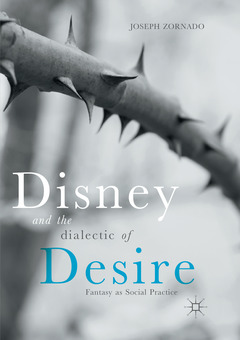Description
Disney and the Dialectic of Desire, Softcover reprint of the original 1st ed. 2017
Fantasy as Social Practice
Author: Zornado Joseph
Language: English
Publication date: 08-2018
Support: Print on demand
Publication date: 11-2017
Support: Print on demand
Description
/li>Contents
/li>Biography
/li>Comment
/li>
This book analyzes Walt Disney?s impact on entertainment, new media, and consumer culture in terms of a materialist, psychoanalytic approach to fantasy. The study opens with a taxonomy of narrative fantasy along with a discussion of fantasy as a key concept within psychoanalytic discourse. Zornado reads Disney?s full-length animated features of the ?golden era? as symbolic responses to cultural and personal catastrophe, and presents Disneyland as a monument to Disney fantasy and one man?s singular, perverse desire. What follows after is a discussion of the ?second golden age? of Disney and the rise of Pixar Animation as neoliberalnostalgia in crisis. The study ends with a reading of George Lucas as latter-day Disney and Star Wars as Disney fantasy. This study should appeal to film and media studies college undergraduates, graduates students and scholars interested in Disney.
1. Introduction: What is Fantasy?.- 2. Chapter Two: Capital, Crisis and the Rise of Disney Fantasy.- 3. Chapter Three: Walt Disney, Snow White, and Trauma of the Real.- 4. Chapter Four: Disney Fantasy as the Discourse of the Other.- 5. Chapter Five: Disneyland and the Perversity of Disney Fantasy.- 6. Chapter Six: Disney, Pixar, and Neoliberal Nostalgia.- 7. Chapter Seven: Conclusion: The Empire Expands: Star Wars as Disney Fantasy.
Joseph L. Zornado is Professor of English at Rhode Island College, USA. He is the author of Inventing the Child: Culture, Ideology, and the Story of Childhood (2001/2007) and of a speculative fantasy in three volumes entitled 2050: A Future History, (2014). He has also co-authored Professional Writing for Social Work Practice (2014) and Professional Writing for the Criminal Justice System (Springer 2017).
These books may interest you

Disney StoriesGetting to Digital 49.57 €



